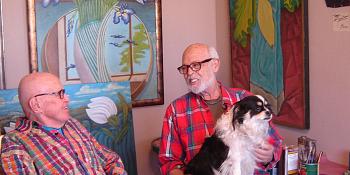For LGBTQ seniors, COVID-19 worsens an epidemic of loneliness
PHOENIX – Reminders to stay connected and reach out to loved ones have been constant during the pandemic. However, as shutdowns and quarantines continued, the safety precautions worsened a long-term issue for LGBTQ seniors – loneliness.
It’s a feeling Lavina Tomer, executive director of Southern Arizona Senior Pride in Tucson, knows all too well.
“In terms of isolation and loneliness – that’s something that we’ve all lived with, with varying degrees at certain times,” she said.
Tomer was just 23 in the 1970s when she came out as a lesbian to her Lebanese-American family of six on the East Coast. The reaction from her religious family was mixed. Although a few were supportive, others were upset and chose to ignore her sexuality.
At church, coming out was traumatic and difficult for Tomer.
“It caused such a big issue that people began to treat me differently,” she recalled. “The minister was not willing to support me. So I chose to leave the church because I felt people were not ready to welcome me in my authenticity.”
At the time, an incredible stigma still dogged LGBTQ Americans, despite a push for social change prompted by such incidents as the Stonewall riots in 1969 in New York City. In that era, it was very common to lose friends and become estranged from family, and that social loss can impact LGBTQ adults for years, leading to physical and emotional decline.
Many lesbian, gay, bisexual, transgender or queer Americans tried to conceal their identities in workplaces and schools, Tomer said, not only to preserve jobs and relationships but to avoid violence.
“We were up against severe consequences if we were visible,” she said. “We knew when it was safe and when it wasn’t safe.”
Tomer recalled an incident in the ’80s, when a man in an elevator became hostile, enraged by an LGBT book she was carrying. She threatened to call the police.
“That moment was scary. It was a direct attack,” said Tomer, who’s now 71. “But while I’ve been through a lot, I haven’t been through what people before me had to go through.”
More than 2.7 million people 50 or older identify as lesbian, gay, bisexual, transgender or queer in the country, according to SAGE, America’s oldest and largest nonprofit dedicated to improving the lives of older LGBTQ people. Members of this community are twice as likely to be single and live alone, and 53% of older LGBT people feel isolated, advocates say.
Sherrill Wayland, director of national education initiatives at SAGE, said it is easy to see how pandemic can lead to increased isolation and loneliness. For many older LGBTQ people, a reliance on families of choice and often same-age peers has exasperated those feelings.



